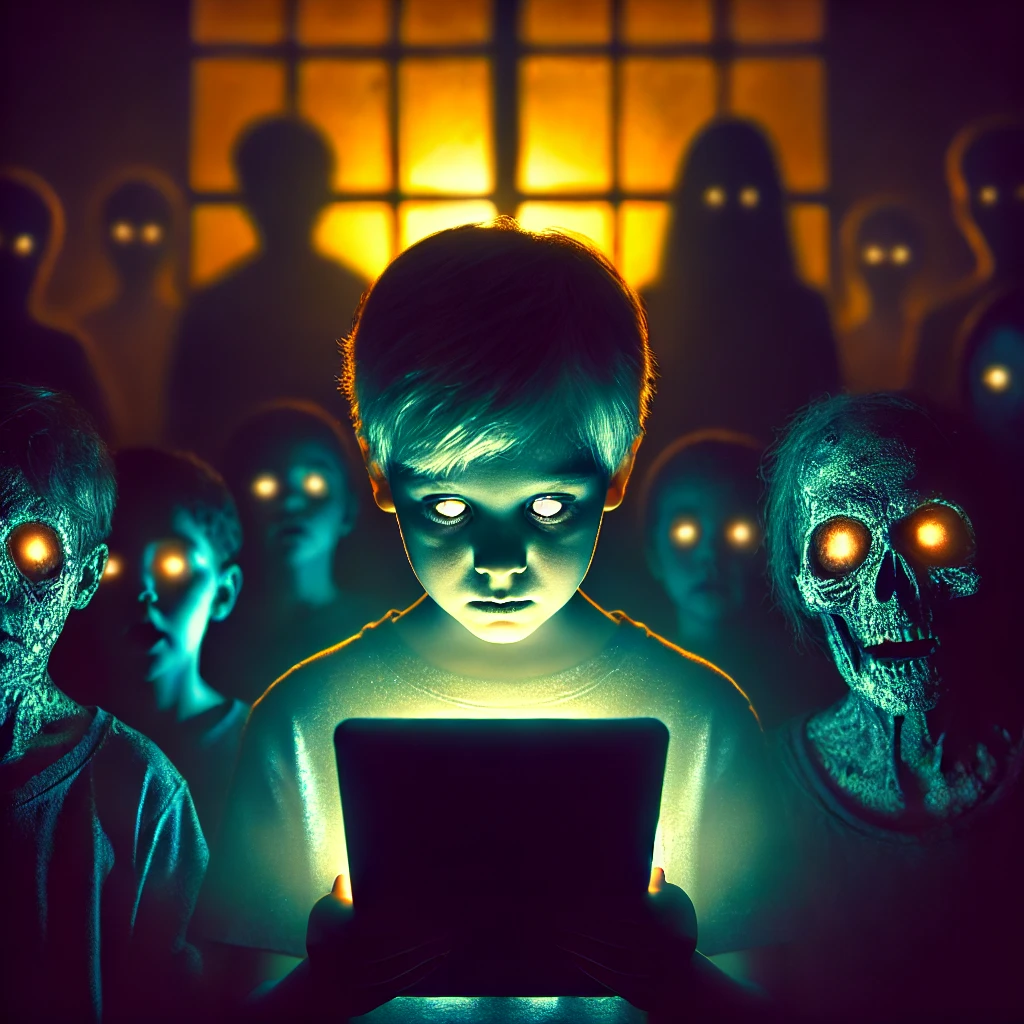Welcome to Letters with Mom here at The Real Underbelly, where we don’t sugarcoat reality—especially when it comes to our kids. So let’s cut to the chase: the grip of technology on our children is out of control, and if you’re just sitting back and letting it happen, you’re part of the problem.

Seriously, have you noticed the grocery store trend? Toddlers slumped in carts, faces glued to screens while their parents zone out like zombies. It’s like we’ve turned devices into digital pacifiers, an easy fix for fussy kids. But here’s the kicker: this “easy fix” is turning our children into mindless drones, unable to engage with the real world, explore their surroundings, or develop essential life skills.
Let’s face it—we’re raising a generation that’s entertained by algorithms and corporations, not life itself. So buckle up, because today, we’re diving deep into the consequences of excessive screen time. We’re here to expose the truth: screens are mind-controlling your kids, and guess what? You’re the one letting it happen!
Technology: The Silent Puppet Master

Let’s get real—technology pulls the strings in our lives like an invisible puppet master. From the moment we open our eyes to the second we drift off at night, screens take charge. Family dinner? Forget it—screens now rule supreme, turning it into a battleground. We’ve become the unwitting stars of our own dystopian movie, where every family member loses themselves in a digital universe.
Is this all some grand experiment to see how easily we can be controlled? Are we just passive consumers, programmed to scroll endlessly? Wake up, people! We’re handing over our lives—and worse, our children’s lives—to this digital overlord without even realizing it.
Are Our Kids Running on Autopilot?
Now, let’s focus on the real victims here: our kids. Are they trapped also in this digital matrix too? Their lives seem to run on autopilot, driven by the glow of screens and the addictive dopamine hits from virtual rewards. And guess what? Therefore, we, as parents, must recognize this and break the cycle.
The Gaming Industry: Your Kid’s Digital Drug Dealer

Here’s a reality check: video games aren’t just harmless fun. They’re meticulously designed to be addictive, and you’re unknowingly handing your kids over to digital drug dealers. Yes, you heard me right. From toddlers glued to tablets in grocery carts to teenagers lost in VR worlds, the pattern is disturbingly clear.
These aren’t just games; they’re carefully crafted traps engineered to hook your kids’ brains. It’s time to pull back the curtain on this digital deception and confront the consequences for your child’s future.
The Gaming Industry’s Dirty Little Secret
Truth be told, gaming and neuroscience are a match made in manipulation heaven. Think it’s a coincidence that gaming giants like Sony and Microsoft are pouring billions into brain research? Think again. They’re not just selling entertainment—they’re selling addiction.
Let’s break it down:
- Dopamine Hits: Games flood your kid’s brain with dopamine, the same chemical that fuels addiction. This creates a vicious cycle, trapping your child in its grip.
- Personalized Addiction: AI and data collection tailor games to your kid’s specific tastes, maximizing screen time and keeping them hooked.
- Flow State Manipulation: Games immerse players in a “flow state,” where time disappears, and they can’t stop playing. It’s addictive—and profitable.
In reality, these companies aren’t just selling games. They’re selling a highly engineered experience designed to keep your kids playing—and paying.
What’s Next? A Grim Future for Our Kids
Next time you see a kid glued to a screen, remember: they’re not just playing—they’re being conditioned. It’s time to question the gaming industry’s true motives and protect your kids from this digital manipulation.
Here’s what the future might hold if we don’t act now:

- Hyper-Realistic Experiences: Immersive experiences will blur the line between reality and virtual worlds, messing with perception and behavior.
- Personalized Addiction: AI and data can create games that perfectly match your kid’s preferences, keeping them hooked longer.
- Monetization Beyond Games: The focus will shift from selling games to milking players with in-game purchases, ads, and microtransactions.
- Total Integration: Gaming will merge with every aspect of life—education, social interaction, shopping—creating a digital trap from which there’s no escape.
Screen Time and OCD: Are We Driving Our Kids to Compulsion?
While the research is still emerging, there’s a disturbing connection between screen time and OCD in kids. The repetitive, compulsive nature of digital activities—like gaming and social media—mimics the behaviors associated with OCD. Plus, the instant gratification of screens is messing with your kid’s brain, potentially setting them up for obsessive thoughts.
But wait, there’s more! The content they consume—especially violent or disturbing stuff—can trigger anxiety, fear, and other OCD symptoms. And let’s not forget the isolation that excessive screen time fosters, which can make kids more vulnerable to OCD.
Bottom line: we don’t know the full story yet, but the evidence is stacking up. Be mindful of your kid’s screen habits and encourage a life that includes, you know, actual human interaction.
The Social Media Illusion: A Toxic Trap Sucks Your Kid In!
Social media platforms claim to foster connection, but let’s be honest—they’re more like breeding grounds for loneliness and low self-esteem. Your kid’s real life can’t compete with the carefully curated, perfect lives they see online, and the constant comparison is crushing their self-worth.

And it gets worse. Social media, linked to spikes in anxiety, depression, and loneliness. Kids are constantly chasing validation with likes and followers, leading to sleep problems, bad grades, and even suicidal thoughts.
Cyberbullying? Don’t even get me started. These platforms give bullies a free pass to torment others with no accountability. The result? Kids dealing with severe emotional distress, anxiety, and depression.
Let’s not kid ourselves—social media isn’t just about connection. It’s about engagement and ad revenue. These platforms exploit your kid’s psychology, and the more time they spend online, the more data these companies collect. It’s a vicious cycle that fuels the machine and keeps your kid addicted.
The Digital Dawn: Utopia or Dystopia?
We’re at a crossroads, folks. Our kids are growing up in a world shaped by technology, and the future is both exciting and terrifying. Let’s be real—what will the next 20 years look like?
On one hand, tech advancements could bring us to a utopia where disease is cured, pollution is eradicated, and human potential is limitless. On the other hand, we’re staring down the barrel of a dystopia where technology becomes a tool of control and oppression.
The most chilling part? We’re merging with machines. Neural implants, brain-computer interfaces, genetic engineering—they might sound cool, but they could sacrifice our humanity for progress. Some even speculate that a shadowy elite is pushing this agenda, aiming to create a population of docile, compliant cyborgs.
Man and Machine: The Dark Fusion

Imagine a future where a vast digital network connects our minds. It sounds convenient, right? But who controls this data, and what happens if the wrong people get hold of it? The potential for misuse boggles the mind.
Even scarier? The psychological impact. Will we lose our empathy, our compassion, our humanity? Could we end up isolated and alienated, retreating into virtual worlds and abandoning the real one?
This isn’t science fiction—it’s a possible future, and it’s coming fast. The choices we make today will determine whether we create a dystopian nightmare or a future where humans and machines coexist harmoniously.
Time to Wake Up, Parents!
What do you think the future holds? Do you feel a twinge of guilt every time you hand your kid a screen to keep them quiet? Or are you all-in on the tech future, embracing what it could mean for your child’s life? Here’s a thought—how about we put down the devices, get outside, and actually engage with our kids? It’s never too late to take control.

The time for complacency is over. So if you care about your kid’s mental health and future, it’s time to reclaim their childhood from the grip of screens. Set boundaries, establish a digital curfew, and create tech-free zones in your home. Encourage your kids to play outside, pick up a hobby, and actually talk to people face-to-face.
Lead by Example
And here’s the kicker—lead by example. If you’re glued to your screen, don’t be surprised when your kid follows suit. Show them the value of unplugging and experiencing life beyond the pixels. By fostering a healthy relationship with technology, you’re giving your kids the tools they need to thrive in a digital world without losing their minds.
So, parents, let’s unite to create a brighter future for our children—a future where they’re not enslaved by screens. We did it, and you can too. The results? A dramatic change in our kids right before our eyes. It’s time to stop putting off that nagging feeling and take action today.
Ultimately, every minute you cut from your child’s screen time is a minute gained for their growth, creativity, and well-being. Let’s protect the minds of the next generation—before it’s too late.
Let’s reclaim what is rightfully our’s in this digital noise we live in. Join us in this exploration of how deep the rabbit hole actually goes.

No responses yet